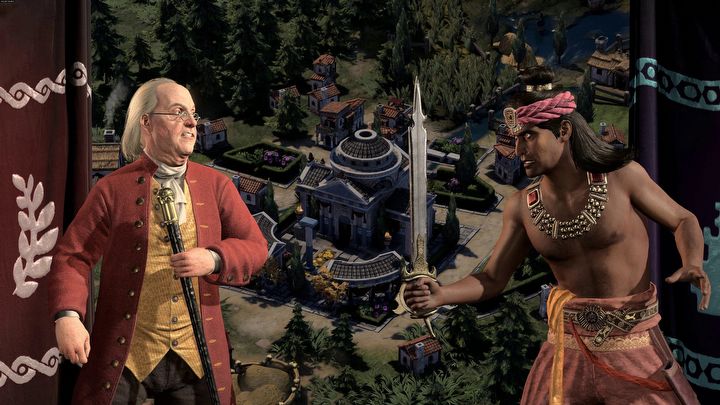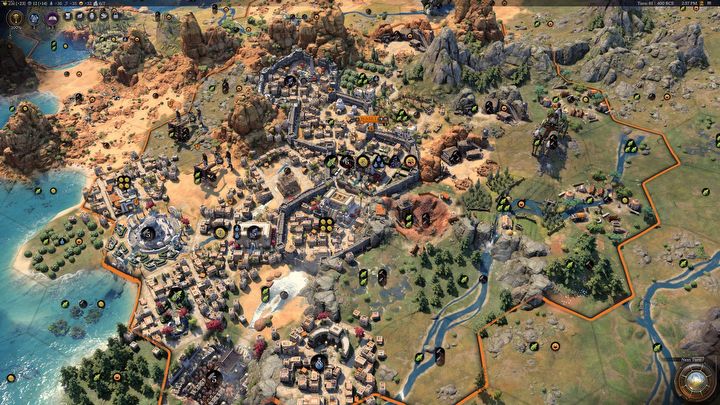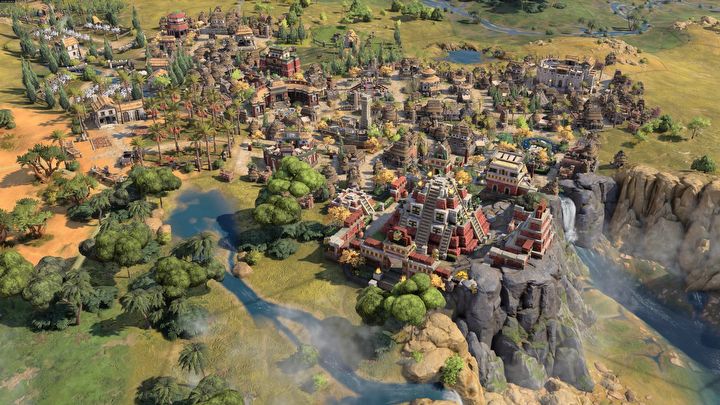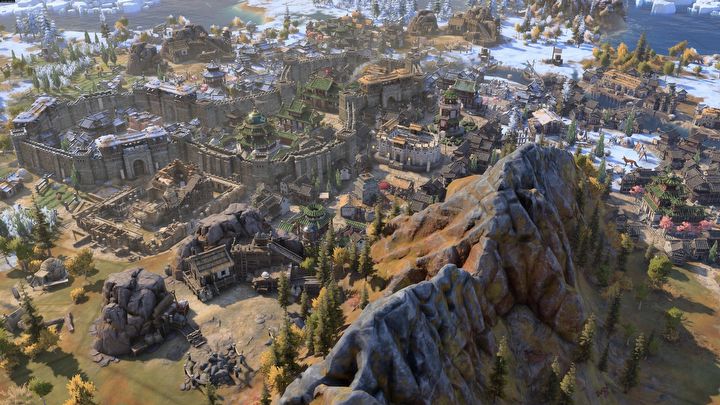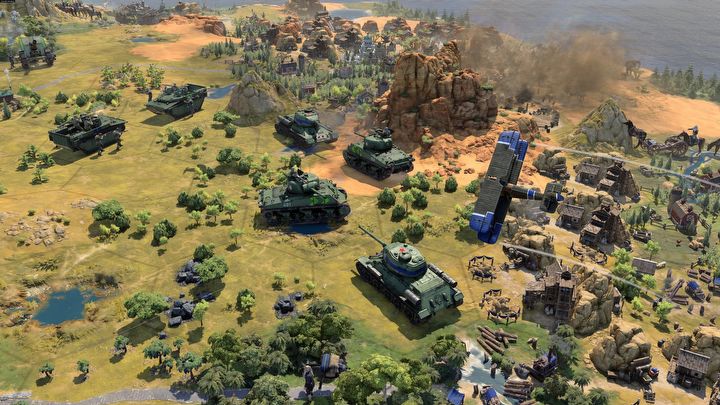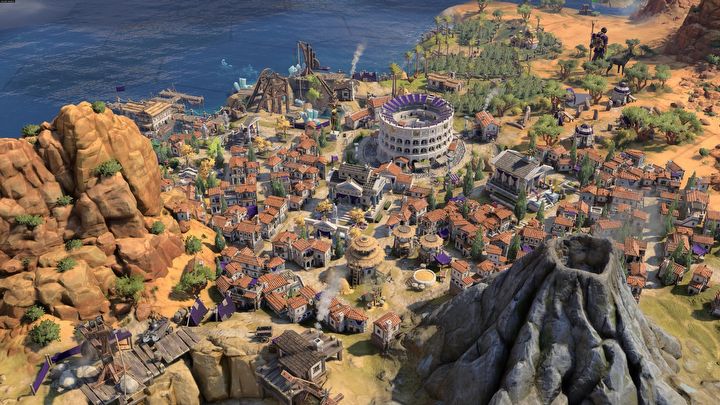I played Civilization 7 for 20 hours and things aren't looking good
It wasn't supposed to be like this. I was supposed to write a praising text about the new Civilization. Unfortunately, for now, Civilization 7 may be the prettiest installment, but... it doesn't look good.
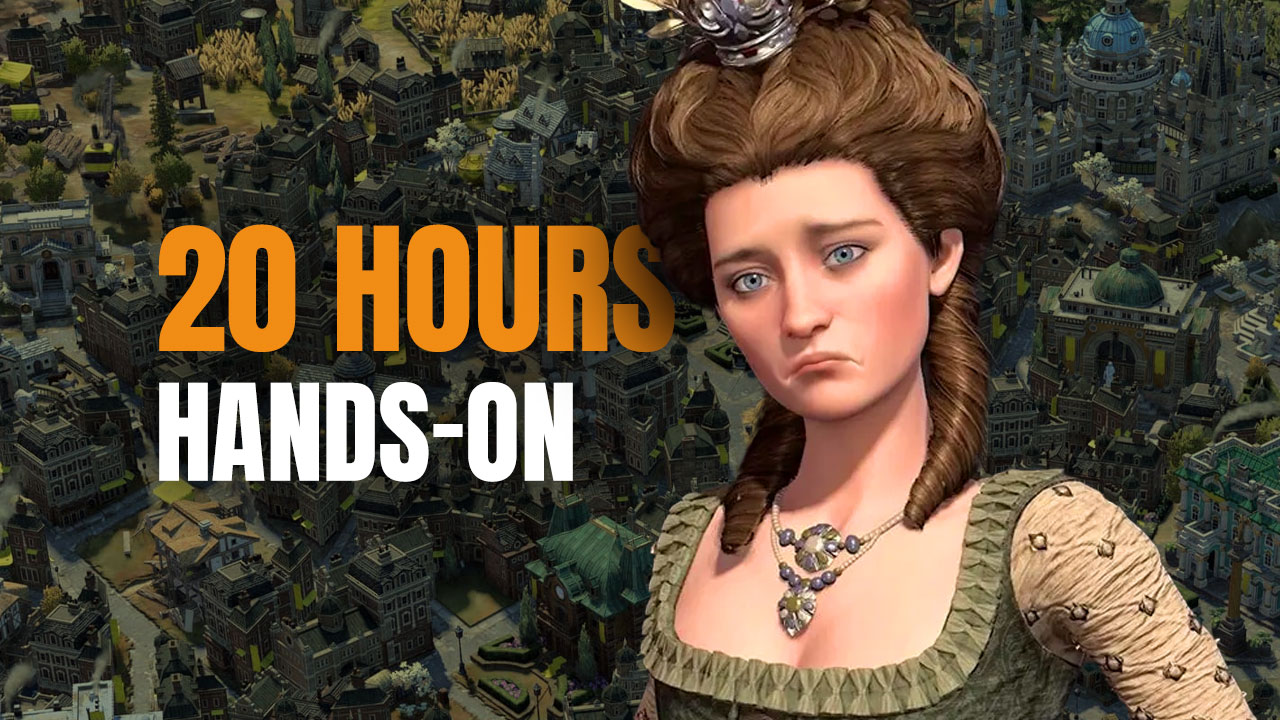
Civilization 7 has promised us a true revolution. In this game, we no longer guide a single civilization from the Bronze Age to moon landings - instead, we transform it twice throughout the gameplay, constructing new empires on the remnants of the old ones.
I must admit that this announcement of a revolution pleased me because it sounded like an attempt to distill from Civilization what is best in it - the excitement in the first phase of the game - and build the entire gameplay on this solid foundation. Unfortunately, after over 20 hours with the game, I have very mixed feelings. I'm having quite a good time, testing different civilizations, learning the rules. I am still drawn to this game every day, but the seventh part too often gives the impression of being chaotic, illegible, and not always well-thought-out. Will I still want to come back once my curiosity about a new game in such an important series for me fades away? I will find out about this only later, and for now I have a handful of initial thoughts for you.
THIS IS NOT A REVIEW
Remember, these are just first impressions. I have spent too little time with the full version of the game so far to be able to rate it - expect a review with a score on February 3rd.
Who messed this up for ya, sir?
Let's start with an example, which in my opinion perfectly shows what Civilization 7 currently is. In the game, following the pattern of previous installments, independent city-states were placed. These are small settlements, not civilizations, with which we can engage in various interactions. Some of them are hostile towards us, so by attacking, they serve a role akin to barbarians, which - I remind you - are missing in the seventh installment. Some city-states, on the other hand, are friendly to us and if we spend a few influence points (a kind of currency in diplomacy), we can take them under our wings. Simply nothing new.
However, problems begin when we take a closer look at this mechanism. To begin with, upon clicking on a subordinate city-state, a menu will pop up offering several options. One of them is "form an alliance." I couldn't do it because the hint displayed in the UI always said: "Your relations are not good enough to form an alliance." Of course, I could assume that this city-state is already my ally, since it helps me in the war. The problem is, I have no idea what our relationship is like. So I don’t how I can change them and how far I am from them being "good enough." There is no menu that would explain this, Civilopedia doesn't help either. As a result, I wonder if this alliance with the city-state is some kind of mechanic that was dropped from the game at some stage of development, but someone forgot to remove the button from the menu?
Damn this alliance - we usually don't need it anyway. When we take over the guardianship of a city-state, it cannot be taken from us - and similarly, we cannot take it from another civilization. The only option is to attack and destroy such a vassal (because city-states cannot be conquered), which also means war with its sovereign. This is a strong simplification of potentially interesting vassal mechanics, which simply boils down to securing a city-state for us. The cherry on top is the fact that if we don't integrate such a vassal into our civilization quickly enough, then after the end of the age, they will simply disappear from the map and be replaced by another entity with no connections to us.
Right now, Civilization 7 is a rather unintelligible game, but ironically, their mechanics are simplified. And above all, it's a game that sometimes gives the impression of being in the final stages of testing. There are many smaller and bigger bugs in it, and a lot of mechanics may look good on paper, but their execution still requires some refinement or deepening.
Revolution of ages
In Civilization 7, the age mechanics are crucial. In a standard game session, we begin in ancient times, transition to the age of discoveries, and conclude in the modern era. Of course, each of these ages has its own separate civilizations, which cannot be encountered at other times. It really can be fun to build a new Norman empire on the foundations of ancient Rome. When medieval knights stand next to the Colosseum. This is something new in Civilization that I think I like the most so far. It's a good idea, even if it's borrowed from rivals like Humankind.
As we go through different ages, we gather legacy points that help fortify our civilization as we approach the next era. However, the first cracks in this concept are starting to appear here. To earn the mentioned points, we need to complete challenges in several different legacy paths, such as military or economic. The problem is that with each of my several attempts, I always had the same objectives to do, which - I fear - would mean a strong repetitiveness of the next playthroughs. I'm still testing this system, but I can already see that it also limits the player's freedom, because like it or not, you have to follow these paths - the same ones every time.
I have another problem related to ages. The devs decided that civilizations beyond heritage will also be united by one leader, whom we choose at the beginning of the game. While I remember that I border Ashoka to the north and Charlemagne resides to the west, I don't really remember who leads my own civilization. It's surprising how little personality the leaders have. The person we choose hardly speaks throughout the entire game, and during the rare diplomatic negotiations (which are greatly simplified, by the way), we can only hear some grunting. Mumbling to yourself with minimal gesticulation is too little for me to really feel that I am playing as Hatshepsut or Xerxes. I find it even more surprising that the developers themselves emphasized the significance of leaders in the seventh game, who were supposed to be the something that binds their changing civilizations.
Finishing the topic of epochs, I want to write down my first impressions of the crises. Various problems arise towards the end of antiquity or the age of discoveries. I have survived invasions of barbarians (in the form of many hostile city-states appearing on the map), rebellions, religious schisms, or an epidemic. So it's good that crises are both diverse and random, it's just a pity that most of them were not particularly interesting. They were not a particular challenge for me either - only the rebellions gave me a hard time, but that was during my first playthrough, when I was still learning everything, so now I would probably handle them better.
I am also sure that the transition between epochs will divide the players. When a new era begins, wars suddenly end, some city-states are replaced by others, part of our army disappears, and the remaining ones automatically advances to units of the next epoch. In addition, a large part of our cities is degraded to the role of towns, which means that they do not lose population, but we cannot develop them as freely until we raise them back to the city level. In other words, it's a game reset - which is something completely new in Civilization. I admit that I need a few more tests to assess how it will perform in the long run, because there were moments when I liked it, and there were times when it simply annoyed me. Unfortunately, it causes a some sort of demotivation at the end of an era, when it's simply not worth investing in certain things, because soon we will, in a way, start anew.
Era of simplifications
I mentioned simplified mechanics in a few places. I will just mention that I was not impressed by the one-dimensional diplomacy, systems reduced to simple bonuses, and not very interesting religion. Even the mini-map is poor and does not show the borders of countries.
How did it happen? I don't know
More than eight years have passed since the excellent sixth installment. I understand the need of the developers from Firaxis to shake things up in the already overexploited formula of the series. They couldn't have released the same game - well, they could have, as proven by EA's history, but I appreciate that they took on this ambitious attempt. The problem is that their revolution seems as if it is still in the process. It is full of chaos, mistakes and distortions. It needs time to take shape, but at this stage it is too late.
I don't understand how one could design such an unreadable map. Although I suspect where this came from - the developers focused on detailed and impressive graphic design. It's really enjoyable to watch how our cities develop over the centuries, occupying more areas of the map, and visually changing with each passing era. This looks absolutely wonderful up close.
The problem is that you can hardly see anything in this mix of colors, and the units completely blend in with the background, which is a hindrance during war. Let's be honest, you can admire Civilization in full close-ups, but still, 95% of the time is spent zoomed out (by the way, the biggest zoom out level from the sixth game, the one that switched to a painted map, was removed). I don't understand why at some stage of production someone didn't say: "listen, this map may be beautiful, but it's also very unreadable, we need to do something about it".
I get the impression that the process of creating this game was not easy and that there were many difficulties. Maybe there wasn't enough time to test various mechanics? This is suggested by the current poor performance (the game tends to freeze), as well as a multitude of major and minor bugs. Of course, it's hard to speculate now where such problems come from, although they most often result from poor management decisions or the publisher's haste. We will probably only find out what has really happened with time.
Second opinion
Przemek Dygas
Civilization 7 was announced as a game that could almost revolutionize the series. New mechanics, a completely different approach to leaders, and changes designed to make even the endgame stop being boring.
Unfortunately, what sounded intriguing in the announcements turns out to be a mistake. The developers borrowed various mechanics from competitors like Humankind, Old World, or Millennia, but they implemented all of them much worse. At the same time, they forgot about their own concepts, which, until now, had been developed from game to game. Civilization 7 lacks even simple QoL solutions that were introduced to the series back in the ancient third game, let alone the advanced mechanics from the previous two games.
At the moment, Civilization 7 is a chaotic production that doesn't really know what it wants to be. What's worse, the game is plagued by numerous technical problems and bugs. The latter might be fixed on the release. However, the foundations of the game are not so easy to fix.
What now?
Remember one thing - I'm writing this text while playing the pre-release version of the game. I constantly arrange many thoughts in my head, I'm still learning this game. In theory, a lot can also change, because there is still some time left until the release, but I must admit that I am rather pessimistic about that. Firstly, when I was playing Civilization 7 at a show in August, I saw similar errors, such as the abysmally stupid AI (a recurring problem in the Civilization games) or ghosts of units stuck on the map that weren't actually there.
Additionally, many of the game's problems stem not so much from bugs, but simply from the fundamentals of the gameplay design. Yes, you can improve heavily built legacy roads, which are the foundation of epoch mechanics (currently they often fail to count our progress), but it won't change the fact that they seem to limit the sandbox nature of the game, putting the player on specific tracks of profitable strategy. So I have little hope that much will change in these important matters by February 11th.
And finally, I must say that this makes me melancholic, like late ancient authors watching the slow fall of Rome. Civilization is one of my favorite series, and also one of the first I ever played in my life. I sincerely loved the sixth installment, I gave it a strong 9/10 and after eight years I still really like it and I stand by this score. So I was incredibly curious about what the developers from Firaxis would prepare for us this time. I was hoping that they would captivate me with their vision again, that I would lose myself for hundreds of hours again. The game still arouses my curiosity, but will it cause the syndrome of one more turn? I will be looking for it, because somewhere under these problems I can see the DNA of this series, but I'm afraid I might instead feel the one turn too many syndrome.
